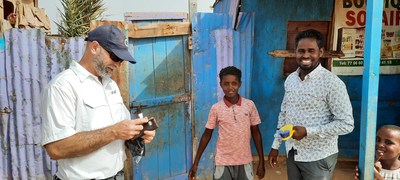- With strong support from the Government of Djibouti, this program will pilot a new Friendly mosquito control technology to combat the growing threat to the region posed by the rapidly spreading malaria vector, Anopheles stephensi.
- Oxitec will work hand-in-hand with the Djibouti Ministry of Health through the national malaria program and with civil society through Association Mutualis, a Djiboutian not-for-profit organisation dedicated to delivering public health impact in Djibouti.
- The invasive Anopheles stephensi has caused massive increases in urban malaria in Djibouti's capital city since it was first reported in 2012. It is also rapidly spreading to other countries in the region.
- This partnership marks the start of a long-term relationship to validate environmentally sustainable vector control tools, which are urgently needed against this difficult-to-control mosquito.
OXFORD, England, May 31, 2022 /PRNewswire/ -- Oxitec Ltd, the leading developer of biological pest control solutions, today announced the launch of a new partnership with the Government of Djibouti and Association Mutualis, a leading not-for-profit organisation serving the public health needs of communities in Djibouti. This exciting partnership was formed in response to a request from the Government of Djibouti to explore how Oxitec's Friendly solutions can deliver impact in towns and cities threatened by vector-borne diseases.

Recent years have seen unprecedented increases in malaria incidence in Djibouti's capital city and surrounding communities. Where national annual malaria cases previously numbered in their hundreds, public health authorities are now reporting many tens of thousands of cases. This explosion has been ascribed to the arrival, first reported in 2012, of a single invasive mosquito species, Anopheles stephensi. Native to Asia, this malaria vector is highly capable of colonising urban locations, unlike many other malaria-transmitting mosquitoes. In Djibouti, where 70% of people live in the capital city, this urban invasion has exposed most of the country's population to a very new and deadly threat. And it is spreading through the region: it has now been reported in Ethiopia, Sudan, Somalia, and is predicted to spread much further. Leading malaria experts have warned that "urgent action is needed to prevent urban malaria epidemics from emerging and causing a public health disaster".
The government of Djibouti has expressed the need for, as part of an integrated approach, innovative solutions to complement existing tools such as mosquito nets, indoor residual spray or environmental management. From that perspective, the Government of Djibouti approached Oxitec in 2018 to explore how the Friendly mosquito technology, already proven against the dengue fever mosquito, Aedes aegypti, could serve as a new tool to combat this urban malaria vector. Oxitec recently launched its Friendly Aedes as a commercial product for households, communities and businesses in Brazil.
Oxitec's malaria program is well under way, and this collaboration heralds a new pilot phase that will enable field validation of the Friendly Anopheles stephensi solution under development.
Grey Frandsen, CEO of Oxitec, said, "We're excited and honored to be partnering with the Government of Djibouti and Association Mutualis as we work together to pilot Oxitec's newest Friendly mosquito technology. It is exactly this type of public-private partnership that unlocks real potential for public health impact to new and growing health challenges. Djibouti's leadership on this front will no doubt serve as an exemplar for how other countries in the region tackle emerging issues, especially in the face of a rapidly changing climate. We are thrilled with our partnership with the Government of Djibouti and Mutualis, as it represents yet another collaboration we undertake to move our technologies to impact."
Djibouti's Ministry of Health commented that "As a government, we are focused on delivering safe, effective and sustainable vector control to protect our people from disease-spreading mosquitoes. This new partnership demonstrates our government's commitment to lead the way in changing how malaria-spreading mosquitoes are combated. We're excited about working with Oxitec to explore the impact that this new solution can deliver in our country's malaria-threatened communities. And we believe that this kind of public-private collaboration is the way forward to deliver impact in many fields."
A spokesperson for Association Mutualis added, "Current vector management tools are inadequate against Anopheles stephensi and, despite our best efforts, malaria continues to blight people in and around our capital city. We have established a strong partnership with Oxitec, with a shared purpose: to improve management of this invasive mosquito for the benefit of malaria-threatened communities. Their Friendly solution represents a promising new tool which we look forward to assessing in Djibouti."
About Oxitec
Oxitec is the leading developer of biological solutions to control pests that transmit disease, destroy crops and harm livestock. Founded in 2002 at the University of Oxford, Oxitec is led by a passionate team comprised of 15 nationalities and is supported by world-class public, private and non-profit partners.
Learn more at oxitec.com.
Photo: https://mma.prnewswire.com/media/1829150/Oxitec_Government_of_Djibouti.jpg

